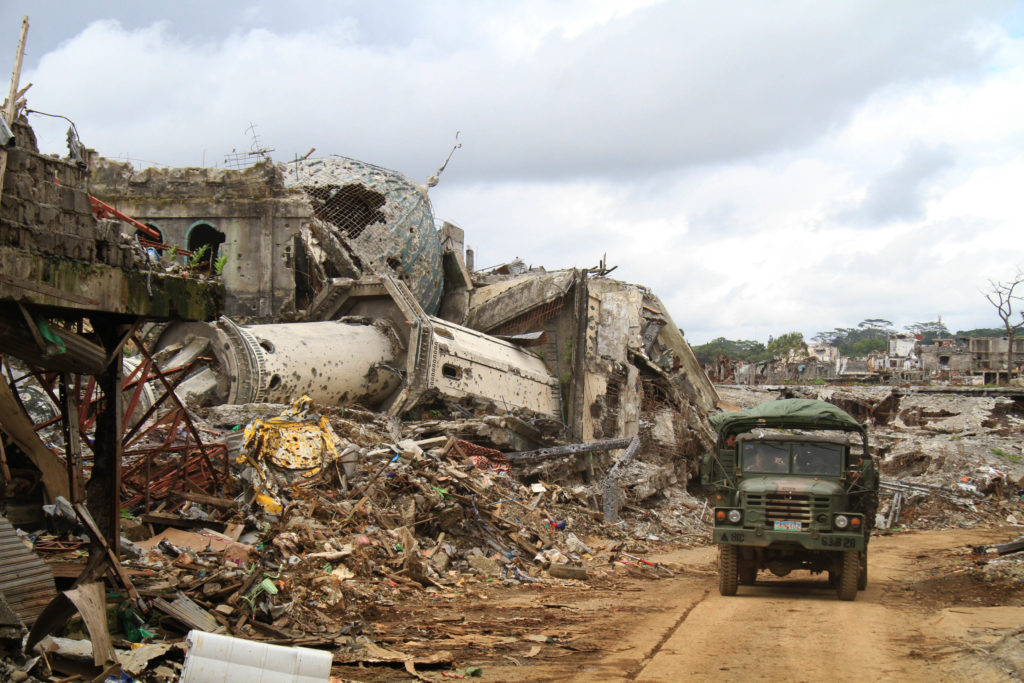
MOSQUE RUINS Passing by the ruins of amosque, soldiers aboard amilitary truck inspect the war-ravaged commercial district of Padian in Marawi City. —RICHEL V. UMEL
The United Kingdom has warned its citizens against traveling to rural areas throughout the Philippines due to prevalent counterinsurgency operations.
The travel advisory was revised on Tuesday to add a warning against travel to the country’s rural areas on top of the existing warning against travel to most places in Mindanao, citing terrorist threats.
“Militant groups operate in rural areas throughout the Philippines,” said the updated foreign travel advice posted on the website, www.gov.uk.
“Armed clashes between security forces and militant groups can occur at any time without warning. Before traveling to rural areas, you should research the area thoroughly,” it said.
Retaliatory attacks
The updated advisory came after Philippine military officials warned of retaliatory attacks in the wake of the defeat of Islamic State (IS)-inspired terrorists in Marawi City.
Government troops killed the last of the terrorists on Monday, ending five months of fighting, but the military said troop withdrawal from the city would be gradual, with many troops staying for other operations and in anticipation of attacks by sympathizers of the slain IS loyalists.
Members of the Philippine National Police Special Action Forces who fought in Marawi returned to their base in Taguig City, Metro Manila, on Wednesday.
They lost four of their colleagues in fighting the pro-IS terrorists in Marawi.
PNP Director General Ronald dela Rosa said the four would be promoted to the next higher rank and awarded medals posthumously.
Rear Adm. Rene Medina, commander of the Naval Forces in Western Mindanao, said the troops being withdrawn would be given time to rest before being deployed for their next assignment.
But returning soldiers, who spoke to the Inquirer on condition of anonymity, said they might also need psychological healing after seeing their colleagues fall dead or get wounded during battle.
Going home
“I am a veteran of several encounters, with the New People’s Army, with the Moro Islamic Liberation Front, but this war was different. We had to deal with casualties every day and it’s psychologically disturbing,” an Army captain said.
More than 400,000 residents displaced by the fighting in Marawi can begin returning to their homes on Sunday, the Department of Social Welfare and Development (DSWD) said on Wednesday.
The Department of Labor and Employment also said it was considering providing more livelihood opportunities to help in the rehabilitation of the returning residents
Labor Secretary Silvestre Bello III said evacuated residents benefited from at least P30 million in emergency employment assistance during the fighting in Marawi.
“We are again considering giving additional assistance,” Bello said. “We will consult with the Department of Social Welfare and Development on how much assistance we would give.”
Terrorist activity
The UK travel advisory retained its warning against all travel to Western and Central Mindanao and the Sulu archipelago “because of terrorist activity and clashes between the military and insurgent groups.”
It also advised against “all but essential travel” to the rest of Mindanao—excluding Camiguin, Dinagat and Siargao Islands—and to south of Cebu province, up to and including the municipalities of Dalaguete and Badian, due to the threat of terrorism.
But the Cebu travel industry was unperturbed, saying the province had always been safe to visit and the government was in control.
“Honestly, these advisories have been there before and visitors don’t ask about [them] anymore,” said Alice Queblatin, president of the Cebu Association of Tour Operations Specialists.
The United Kingdom also warned its citizens traveling to Manila and other major cities that “terrorists are very likely to try to carry out attacks in the Philippines, including in Manila.” —With reports from Jaymee T. Gamil, Jhesset O. Enano, Julliane Love de Jesus, Victor Silva, Julie Alipala and Richel Umel